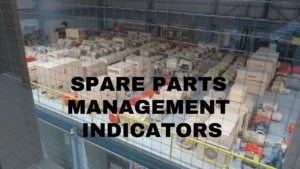Developing a Spare Parts naming convention can be a challenge, from the lack of description standardization among parts manufacturers to CMMS & ERP systems templates (parts classification) being configured by individual users. Typically, the description is either entered manually or by a template that comes with the CMMS, ERP or third party software.
In our opinion, spare parts should be fully described with a complete, concise description that will lead the maintenance planner or technician to select the correct part from a printed or electronic catalogue. In addition, the description should preclude misinterpretation by the supplier of what is being purchased. On occasions, it is convenient to add the mfg. part number to the description. Search engines built into the different systems improves locating a spare part. However, they cannot locate the part if the key information does not exist. A format widely used for spare parts description is:
Noun, Qualifier 1, Qualifier 2, Qualifier 3, Qualifier 4…….
The amount of qualifiers will be dictated by the length of the Description field in your CMMS or ERP software. Usually, you can add additional information in the long description field or purchase text. However, this information seldom appears in reports or in screens (unless triggered).
Those systems that are tied into a description template, the qualifiers are pre-defined and established in the part classification. After entering the information in the template, the description is built using the Noun – Qualifier format.
When the description is entered manually, it depends on a storeroom keeper, technician, project engineer, documentation clerk, commissioning agent, or any other that has the responsibility to add parts into a CMMS, ERP, database or a spreadsheet. This person uses whatever guide they have available to describe the part. If the person is not familiar with spare parts they usually use the equipment manufacturer’s part description. These descriptions are usually vague, abbreviated and tend to give the impression that you need to purchase it from this manufacturer. When this person is no longer in that position, the next person, will try to follow or uses another set of naming convention.
Examples of Spare Parts descriptions that follow the Noun, Qualifiers format are:
- Electric AC Motors
Example: MOTOR, AC, 5HP, 1745, 575V, 3PH, 5.4A, 184, 1.15, UJ5S2G
Field length – 50 - Bearing
Example: BEARING, BALL, 6204ZZ/C3, SINGLE ROW, DEEP GROVE, METAL SHIELD, SEALED
Field length – 80
Example – BRG,6204ZZ/C3,SROW,DGRV, MTL, SEALED
Field length – 40 - For specific machine parts, the description should include or reference the equipment, part, or material specifications.
Example: ROCKER ARM, LEFT SIDE, CUSTOM, S/S, POLISHED, BOX CLOSING

Get even more tips and techniques to improve your Master Data with our Materials and Spare Parts Management training. You can attend a public course or bring our team to your location.



